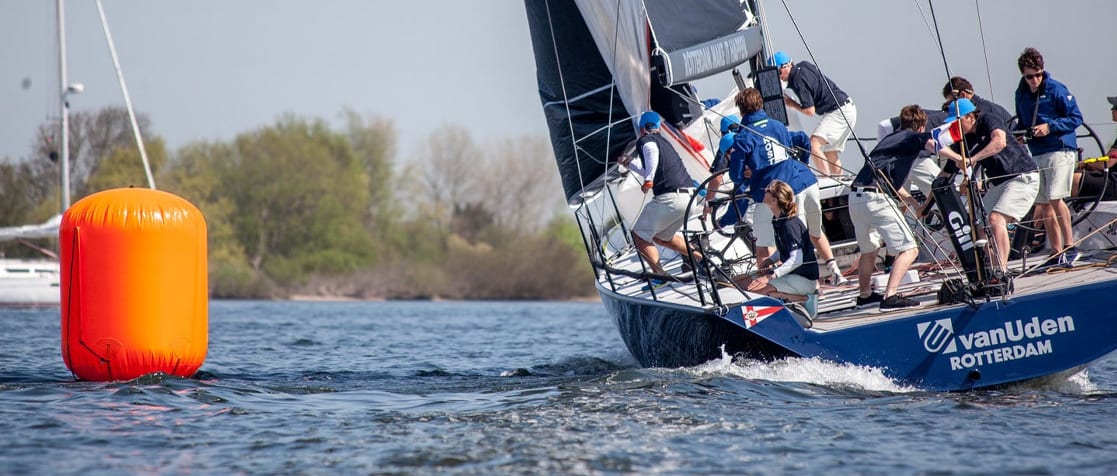
It’s all about saili .. entertainment
Multiple world championships, three times around the world with the Volvo Ocean Race and multi-year record holder of the world 24-hour speed record. Gerd-Jan Poortman’s trophy cabinet is impressive. Although the 44-year-old Dutchman, father of three, can be found more often at home than on the water these days, his deep-rooted passion for sailing is far from retired. As a sailing coach of the Rotterdam Offshore Sailing Team & Ker 46 Van Uden, he transfers his know-how to new generations of sailing talents. But anyone who thinks that the lessons of the past are a matter of copy-paste is wrong. Times have changed, also for talent development. “Young talents nowadays have become freelancers. Additionally to good sailing skills, you need to be able to sell yourself to succeed in professional sailing.”
It is 2014 when the Rotterdam Royal Rowing and Sailing Association ‘De Maas’, mainly known for Olympic sailing titles, launches an ambitious talent program for Dutch sailing talent. The main goal: prepare ‘the future’ for professional offshore sailing. The means: drastic measures. As a renowned name, Gerd-Jan is appointed as the dream captain. In the sporty carbon fiber Ker 46, purchased by transport company Van Uden Group, finds men a competitive boat to win prizes. And a healthy financial base is found by attracting seven dedicated sponsors from the maritime industry. It turns out to be a very solid foundation for later successes.
Gerd-Jan starts to tell passionately when we ask him about the start of the Rotterdam Offshore Sailing Team. “I had not much doubt when they asked me to lead this project. It is fantastic to train and compete with a fixed group of young sailors for a long period. The enthusiasm and eagerness of these kids never get boring,” says Gerd-Jan. The first time it was possible to openly apply for a spot on board, the initiators were inundated with dozens of application letters. ”Like every round, we make a selection to a smaller permanent team of 16 men and women. After some sailing and a good conversation, you know who got potential and who not,” says Gerd-Jan. “After the selection, we start with an intensive trajectory. In three years, we prepare them for the ‘big work’, and train them to be experts in specific disciplines. All-rounders are useless in this market. A jack of all trades won’t be hired,” says Gerd-Jan.
Anyone who thinks that they will be continuously taken by the hand during the talent program couldn’t be more wrong. The red line of the program is self-development. “I think it is important that they learn to discover for themselves. I provide guidance and hints, but in the end, they have to do it themselves. For example, if I tip the navigator about some useful tools to prepare for races, I expect that he will stick to that. I like to see me as a conductor of the team,” says Gerd-Jan. ”Only those who can go along with it that principal will eventually excel and take a good chance for a place in professional sailing. ”
In addition to self-discipline, a strong personality and good social communication are also required qualities to survive in the field. “Professional sailing has become ninety per cent entertainment business,” warns Gerd-Jan. “I urge the talents that it is no longer just taking. It has become much more giving. Show respect to the boat owners. Make sure to be on the boat an hour in advance to clean. Buy a beer for the sponsor. Have a chat with competitors. Sure… the bottom line is good sailing skills. But only when you learn to appreciate the other factors you can succeed.’’
So times have changed. The time you can blindly rely on your sailing skills to get on board is in the past. Gerd-Jan continues: “I see more often than the boys and girls with impressive social skills get a chance on big boats more quickly than other more talented sailors. That requires a different approach in counselling. I turn them into freelancers, self-employed professionals who can stand on their own two feet, on- and offshore.” That specific approach of the Dutch coach has resulted in more and more training hours between the study books. Clinics alternate with presentations at companies. And from making your own planning to approaching sponsors. It all passes.
The intensive talent program has paid off. Renowned boats were beaten by the team during (inter-) national regattas, with podium places as compelling evidence. More importantly, a number of the talents of the Dutch top coach manage to continue their way to success after three seasons of training. “It is an illusion that all sixteen of them can immediately board the big boys,” concluded Gerd-Jan. ”But at least three to four talents transfer to professional sailing immediately after completing the program.” It is therefore not the quantity, but the quality of the talents that makes the sailing coach satisfied: ”Latest I received a text message from a boat owner. About a talent of mine who had just come on board. The owner was highly impressed with his conviction and skills. That’s fantastic, right? It makes me so proud. That’s what I do it for.”